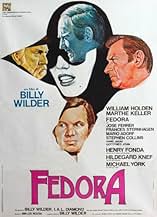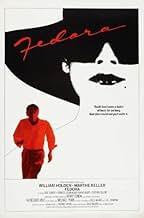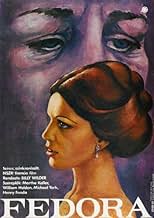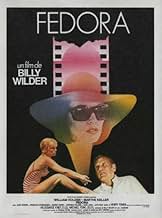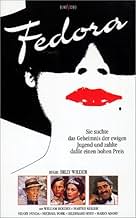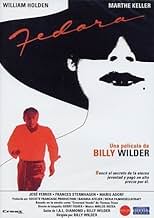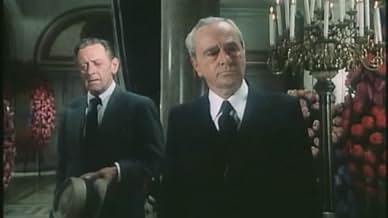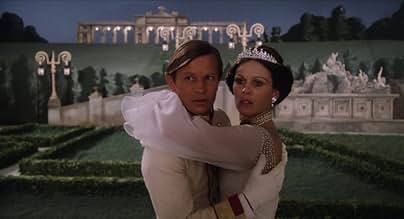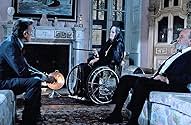VALUTAZIONE IMDb
6,8/10
5627
LA TUA VALUTAZIONE
Il produttore di Hollywood Barry Detweiler cerca di far uscire Fedora, una famosa ma solitaria attrice cinematografica, dal pensionamento.Il produttore di Hollywood Barry Detweiler cerca di far uscire Fedora, una famosa ma solitaria attrice cinematografica, dal pensionamento.Il produttore di Hollywood Barry Detweiler cerca di far uscire Fedora, una famosa ma solitaria attrice cinematografica, dal pensionamento.
- Regia
- Sceneggiatura
- Star
- Premi
- 1 vittoria e 1 candidatura in totale
Robert Cunningham
- Assistant Director
- (as Bob Cunningham)
Recensioni in evidenza
It puzzles me why this film appears to have been so forgotten and neglected because I find it richly entertaining and, like so much of Wilder's work, it shows an abiding, (although not uncritical), love / hate of Hollywood and all it represented. Wilder has no illusions about the Monster Hollywood could be in its heyday when it created an almost parallel universe which consisted of those on the inside the industry, and the rest of us who paid homage at the box-office. Both parties were almost entirely oblivious of the reality of life as experienced by each other.
FEDORA is much more bitter-sweet than SUNSET BLVD., (his other film with which it is natural to compare it, and of course the presence of William Holden in both makes this even more compelling), but here we see people who, having made a pact with the devil of Hollywood fame and fortune, find it is a two edged sword that keeps them in the service of its mores and values forever, even though the effort of doing so nearly makes them die from exhaustion. Death or permanent seclusion is the only way to preserve a legend's immortality.
Beautifully structured, and with some excellent dialogue, all the cast acquit themselves with credit, and I find it a fascinating and valuable glimpse into a world that has now gone forever and which is never, ever likely to return. Perhaps more reflective and introspective than we expect a Billy Wilder film to be, but all the more richly satisfying for it. Highly recommended.
FEDORA is much more bitter-sweet than SUNSET BLVD., (his other film with which it is natural to compare it, and of course the presence of William Holden in both makes this even more compelling), but here we see people who, having made a pact with the devil of Hollywood fame and fortune, find it is a two edged sword that keeps them in the service of its mores and values forever, even though the effort of doing so nearly makes them die from exhaustion. Death or permanent seclusion is the only way to preserve a legend's immortality.
Beautifully structured, and with some excellent dialogue, all the cast acquit themselves with credit, and I find it a fascinating and valuable glimpse into a world that has now gone forever and which is never, ever likely to return. Perhaps more reflective and introspective than we expect a Billy Wilder film to be, but all the more richly satisfying for it. Highly recommended.
Billy Wilder revisits the territory of his Hollywood Babylon classic Sunset Boulevard, with the same male lead (William Holden) in an almost identical role as a washed-up screenwriter trying to get to a reclusive and mysteriously ageless one-time screen queen in order to pitch her a comeback script. Story elements include Oscar Wilde's Picture of Dorian Gray and (off-screen) the many mad-doctor yarns of the 1930s and 1940s in which Boris Karloff messes about with Things We Were Never Meant To Know. Looks great in a brittle and glitzy 1970s way, as befits its scornfully depicted international-rich-white-trash milieu. Essentially it's a sombre but humanistic sermon on the hopeless worship of physical youth and beauty: as a medieval English writer put it, "who sows hope in the flesh reaps bones". A very relevant film for our narcissistic times, its only big flaw is that it's a mighty chilly piece of work, easier to admire than to love.
I wish to defend Fedora somewhat from the sole previous IMDB reviewer. It is not a great movie such as "Sunset Boulevard" but it is hugely enjoyable and a real treat for anyone interested in old Hollywood, and the bitter-sweet quality of fading glamour.
Since the death of Marlene Dietrich, and especially with the publication of a biography by her daughter Maria Riva, it is now clear that Fedora is a direct portrait of Ms. Dietrich with much telling accurate detail.
Billy Wilder knew Dietrich and old Hollywood well, and even though made in the 70's, the film captures a genuine essence probably for the last time as figures from the golden age of film have since then moved into retirement and sadly largely slipped the mortal coil.
The real story of the EXTRAORDINARY Ms. Dietrich is better than any of her movies, and Fedora tells some of that story. It makes for more comfortable viewing than Maximillian Schell's documentary "Marlene".
Wilder is an intelligent director, which makes "Fedora" worthwhile viewing. I have always found "Sunset Boulevard" a little too arch and self-consciously aware; "Fedora" is a more lyrical piece by the director as an older man.
Since the death of Marlene Dietrich, and especially with the publication of a biography by her daughter Maria Riva, it is now clear that Fedora is a direct portrait of Ms. Dietrich with much telling accurate detail.
Billy Wilder knew Dietrich and old Hollywood well, and even though made in the 70's, the film captures a genuine essence probably for the last time as figures from the golden age of film have since then moved into retirement and sadly largely slipped the mortal coil.
The real story of the EXTRAORDINARY Ms. Dietrich is better than any of her movies, and Fedora tells some of that story. It makes for more comfortable viewing than Maximillian Schell's documentary "Marlene".
Wilder is an intelligent director, which makes "Fedora" worthwhile viewing. I have always found "Sunset Boulevard" a little too arch and self-consciously aware; "Fedora" is a more lyrical piece by the director as an older man.
Billy Wilder is celebrated for a streak of movies that starts with the groundbreaking film-noir "Double Indemnity" and "Lost Weekend" and ends with the comedy classics "Some Like it Hot" and "The Apartment". In between, you have such titles as "Sunset Blvd.", "Stalag 17", Sabrina" and "Witness for the Prosecution", I guess if any movie lover was asked about the 10 greatest movies from the Golden Age, a fistful of Billy Wilder films would be mentioned.
This is just to say that this is the kind of legacy a foreign director, who escaped from the Nazis and never got rid of his German accent, can be damn proud of, he literally owned American cinema and defined many genres. After the sixties, he still had a share of enjoyable movies but they never reached the same iconic status. And when the New Hollywood was built on the ruins of the studio system, Billy Wilder became the incarnation of old school, conventional cinema: big names, big stars and big stories. Wilder's motto was "thou shall not bore the audience" but then came a time where moviegoers, mostly grown-up baby boomers, were enthralled by the spectacle of Bonnie and Clyde's machine-guns, the French Connection' chase, Scorsese's mean streets and the intimacy of the Corleone family. Wilder became the bore, audience-wise.
"Those kids with beards are running things" laments the has-been Larry Detweiller aka "Dutch" played remarkably by William Holden, and his words couldn't have echoed more Billy Wilder's resentment toward the new ways of Hollywood or what was left of it. In the midst of the raging bulls and easy riders' era, the merit of "Fedora" is to provide the interesting insight from a director of the old generation. When the time of Ford, Minnelli or Hitchcock was over, Wilder was still here and made one, deliberately conventional and classic move or movie, so against the current it was meant to fail. But now, after four decades, "Fedora" has aged surprisingly well. It's not a masterpiece but the story is likely to content the movie lovers we are.
In fact, it illustrates this quote from Jean-Luc Godard: "the best way to criticize a film is to make one". And Billy Wilder, adapting the novel 'Crowned Heads', paid a tribute to the Golden Age through the portrayal of Fedora, a star who used to be big but then saw her stardom fade, only to resurrect a few years after. When asked if there was any similarity between "Fedora" and "Sunset Blvd.", Wilder naively said no, but even though it wasn't intentional, one can't have a cinema-themed Billy Wilder's film, featuring William Holden, much more in the narrator's role, and not have "Sunset Blvd." in mind. If anything, the film comes full circle with the classic noir: in the 70's, the Golden Age was the silent era, they didn't need blazing guns and naked breasts, only dialogues and faces.
Fedora was the biggest of her time, mentioning real-life stars and fictional movies as if the film was set in a parallel universe yet close to the reality, just like Norma Desmond interacting with Cecil B. De Mille, as to emphasize the dream-like aura of Hollywood. Then she abruptly ended her career and lived in in remote locations on the Riviera and started to make movies again after a few years of absence, this is where Dutch comes, trying to approach her to star in an adaptation of Anna Karenina, He notices some strange happenings, Fedora seems imprisoned by a group of people as colorful as intimidating: an old Countess with a husky voice (Hildegard Knef), a mysterious plastic surgeon played by Jose Ferrer and a sinister watchdog played by Frances Sternhagen (she was the sheriff's wisecracking wife in "Misery").
The "Sunset Blvd." déjà vu deepens and Dutch' investigation leads to the ultimate revelation about the story of Fedora. And it is intriguing and haunting within its own limitation with a fascinating mix of real actors like Henry Fonda and Michael York, in the intrigue. The main problem with the film is that the peripheral characters actually work better than the central one, Holden is perfect but like many critics pointed out, there had to be an actress of Marlene Dietrich' caliber to play the faded star because the flashbacks don't leave us with the conviction of a Golden Age aura on Fedora. There had to be a Katharine or Audrey Hepburn, Ingrid Bergman, but I guess the film was victim of its era, Wilder didn't have the same touch and only his old buddy William Holden was here to close the loop with "Sunset Blvd.".
But I love the way the film feels like a swan song of the old school and close the curtain on Wilder's five-decade contribution to Cinema, as if he was paying a final tribute to his art. He would later make a film with Lemmon and Matthau, a remake of a French classic farce but the film was of such abysmal quality it was dismissed as part of Wilder's canon, and "Fedora" is a worthy ending to his prolific career. I didn't necessarily enjoy the film, I would say I watched it with mere curiosity, able to appreciate its intent more than its result, but the making of the film is very fascinating, seeing the old Wilder wrestling with the new system to get his film made, along with I.A.L Diamond, is a great lesson of humility and determination.
After knowing the truth about Fedora, which is a self-referential cased of Naked Empress, Dutch says it would make a better story than the one he had in mind; I guess the same goes with the making of 'Fedora',
This is just to say that this is the kind of legacy a foreign director, who escaped from the Nazis and never got rid of his German accent, can be damn proud of, he literally owned American cinema and defined many genres. After the sixties, he still had a share of enjoyable movies but they never reached the same iconic status. And when the New Hollywood was built on the ruins of the studio system, Billy Wilder became the incarnation of old school, conventional cinema: big names, big stars and big stories. Wilder's motto was "thou shall not bore the audience" but then came a time where moviegoers, mostly grown-up baby boomers, were enthralled by the spectacle of Bonnie and Clyde's machine-guns, the French Connection' chase, Scorsese's mean streets and the intimacy of the Corleone family. Wilder became the bore, audience-wise.
"Those kids with beards are running things" laments the has-been Larry Detweiller aka "Dutch" played remarkably by William Holden, and his words couldn't have echoed more Billy Wilder's resentment toward the new ways of Hollywood or what was left of it. In the midst of the raging bulls and easy riders' era, the merit of "Fedora" is to provide the interesting insight from a director of the old generation. When the time of Ford, Minnelli or Hitchcock was over, Wilder was still here and made one, deliberately conventional and classic move or movie, so against the current it was meant to fail. But now, after four decades, "Fedora" has aged surprisingly well. It's not a masterpiece but the story is likely to content the movie lovers we are.
In fact, it illustrates this quote from Jean-Luc Godard: "the best way to criticize a film is to make one". And Billy Wilder, adapting the novel 'Crowned Heads', paid a tribute to the Golden Age through the portrayal of Fedora, a star who used to be big but then saw her stardom fade, only to resurrect a few years after. When asked if there was any similarity between "Fedora" and "Sunset Blvd.", Wilder naively said no, but even though it wasn't intentional, one can't have a cinema-themed Billy Wilder's film, featuring William Holden, much more in the narrator's role, and not have "Sunset Blvd." in mind. If anything, the film comes full circle with the classic noir: in the 70's, the Golden Age was the silent era, they didn't need blazing guns and naked breasts, only dialogues and faces.
Fedora was the biggest of her time, mentioning real-life stars and fictional movies as if the film was set in a parallel universe yet close to the reality, just like Norma Desmond interacting with Cecil B. De Mille, as to emphasize the dream-like aura of Hollywood. Then she abruptly ended her career and lived in in remote locations on the Riviera and started to make movies again after a few years of absence, this is where Dutch comes, trying to approach her to star in an adaptation of Anna Karenina, He notices some strange happenings, Fedora seems imprisoned by a group of people as colorful as intimidating: an old Countess with a husky voice (Hildegard Knef), a mysterious plastic surgeon played by Jose Ferrer and a sinister watchdog played by Frances Sternhagen (she was the sheriff's wisecracking wife in "Misery").
The "Sunset Blvd." déjà vu deepens and Dutch' investigation leads to the ultimate revelation about the story of Fedora. And it is intriguing and haunting within its own limitation with a fascinating mix of real actors like Henry Fonda and Michael York, in the intrigue. The main problem with the film is that the peripheral characters actually work better than the central one, Holden is perfect but like many critics pointed out, there had to be an actress of Marlene Dietrich' caliber to play the faded star because the flashbacks don't leave us with the conviction of a Golden Age aura on Fedora. There had to be a Katharine or Audrey Hepburn, Ingrid Bergman, but I guess the film was victim of its era, Wilder didn't have the same touch and only his old buddy William Holden was here to close the loop with "Sunset Blvd.".
But I love the way the film feels like a swan song of the old school and close the curtain on Wilder's five-decade contribution to Cinema, as if he was paying a final tribute to his art. He would later make a film with Lemmon and Matthau, a remake of a French classic farce but the film was of such abysmal quality it was dismissed as part of Wilder's canon, and "Fedora" is a worthy ending to his prolific career. I didn't necessarily enjoy the film, I would say I watched it with mere curiosity, able to appreciate its intent more than its result, but the making of the film is very fascinating, seeing the old Wilder wrestling with the new system to get his film made, along with I.A.L Diamond, is a great lesson of humility and determination.
After knowing the truth about Fedora, which is a self-referential cased of Naked Empress, Dutch says it would make a better story than the one he had in mind; I guess the same goes with the making of 'Fedora',
I devoured Tom Tryon's book and I made my own film in my mind. Needless to say, I loved it. Then I heard that Billy Wilder was going to direct the film version. Perfect, I thought, perfect. I wanted to write to Mr. Wilder to let him know about the film I had already in my mind, not camera shots, naturally, but casting. There was only one actress who could play the Garboesque Fedora in all her mysterious splendor and that was Vanessa Redgrave, then,at that exact moment in time. She was the only actress who could be all the other actresses we've always known and loved rolled into one. That in itself made her unique, spellbinding. Rachel Kempson a great British actress plus Vanessa's mother in real life, to play the old lady. The film was made with Marthe Keller and Hildegarde Kneff in those roles. I hoped for Terence Stamp to be the actor of Fedora's dreams. They chose Michael York. I remember a review by Pauline Kael I believe, when she came to review Michael York in this film her comment was succinct: "Michael York plays himself, unconvincingly". Maybe this is a suitable case for remake. With all due respect to Mr. Wilder, one of my heroes, maybe Cameron Crowe should have a go.
Lo sapevi?
- QuizPrior to a preview in Santa Barbara, United Artists had cut twelve minutes from the movie. Director Billy Wilder refused to allow any further cuts, and the screening went poorly, with the audience laughing during the wrong parts of the film.
- BlooperIn the opening scene set in France in 1977, a woman throws herself in the path of a steam train. The last steam locomotives on mainline French railways were withdrawn in 1974, so this could not have happened as shown.
- Citazioni
The Countess: Remember those days? Moral turpitude? You could have six husbands but you couldn't have an illegitimate child. Now you can have six children and no husband and who cares.
- ConnessioniFeatured in Arbeiten mit Billy Wilder: Ein Gespräch mit Mario Adorf (2014)
I più visti
Accedi per valutare e creare un elenco di titoli salvati per ottenere consigli personalizzati
- How long is Fedora?Powered by Alexa
Dettagli
- Data di uscita
- Paesi di origine
- Lingue
- Celebre anche come
- Федора
- Luoghi delle riprese
- Madouri Island, Lefkada, Grecia(Fedora's private island)
- Aziende produttrici
- Vedi altri crediti dell’azienda su IMDbPro
Botteghino
- Budget
- 6.727.000 USD (previsto)
- Tempo di esecuzione1 ora 56 minuti
- Mix di suoni
- Proporzioni
- 1.85 : 1
Contribuisci a questa pagina
Suggerisci una modifica o aggiungi i contenuti mancanti



